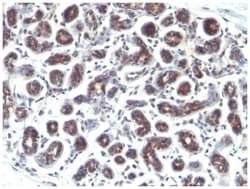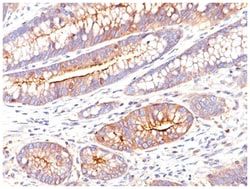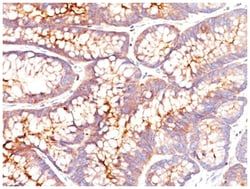TFF1/pS2 Mouse, Clone: GE2 (same as R47/94), Novus Biologicals™
Manufacturer: Fischer Scientific
Select a Size
| Pack Size | SKU | Availability | Price |
|---|---|---|---|
| Each of 1 | NBP234293F-Each-of-1 | In Stock | ₹ 23,852.00 |
NBP234293F - Each of 1
In Stock
Quantity
1
Base Price: ₹ 23,852.00
GST (18%): ₹ 4,293.36
Total Price: ₹ 28,145.36
Antigen
TFF1/pS2
Classification
Monoclonal
Conjugate
Unconjugated
Formulation
PBS with 0.05% BSA. with 0.05% Sodium Azide
Gene Alias
BCEIbreast cancer, estrogen-inducible sequence expressed in, Breast cancer estrogen-inducible protein, breast cancer estrogen-inducible sequence, D21S21, gastrointestinal trefoil protein pS2, hP1.A, HPS2, pNR-2, Polypeptide P1.A, Protein pS2, pS2, trefoil factor 1, trefoil factor, BCE1, human pS2 induced by estrogen from human breast cancercell line M10HP1.A
Host Species
Mouse
Molecular Weight of Antigen
6.5 kDa
Quantity
0.02 mg
Research Discipline
Breast Cancer, Cancer
Gene ID (Entrez)
7031
Target Species
Human, Primate
Form
Purified
Applications
Western Blot, Flow Cytometry, Immunocytochemistry, Immunofluorescence, Immunoprecipitation, Immunohistochemistry (Paraffin)
Clone
GE2 (same as R47/94)
Dilution
Western Blot 0.5-1.0ug/ml, Flow Cytometry 0.5-1ug/million cells, Immunocytochemistry/Immunofluorescence 0.5-1ug/ml, Immunoprecipitation 0.5-1ug/500ug protein lysate, Immunohistochemistry-Paraffin 0.5-1ug/ml, Immunohistochemistry-Frozen 0.5-1ug/ml, SDS-Page
Gene Accession No.
P04155
Gene Symbols
TFF1
Immunogen
Synthetic peptide of 28 amino acid residues corresponding to CFDDTVRGVPWCFYPNTIDVPPEEECEF (aa57-84) from the C-terminus of human pS2.
Purification Method
Protein A purified
Regulatory Status
RUO
Primary or Secondary
Primary
Test Specificity
It recognizes a polypeptide of 6.5kDa, identified as pS2 estrogen-regulated protein. Its epitope is localized between aa57-84 of human pS2 protein. pS2 is a trefoil peptide. Trefoil peptides are protease resistant molecules secreted throughout the gut that play a role in mucosal healing. These peptides contain three intra-chain disulfide bonds, forming the trefoil motif, or P-domain. pS2 is known to form dimers and this dimerization is thought to play a role in its protective and healing properties. About 60% of breast carcinomas are positive for pS2. Staining is cytoplasmic, often with localization to the Golgi apparatus. pS2 is shown to be localized in normal stomach mucosa, gastric fluid, goblet cells in the colon and small intestine, and in ulcerations of the gastrointestinal tract. Several studies have shown that pS2 is primarily expressed in estrogen receptor-positive breast tumors and it may define a subset of estrogen-dependent tumors that displays an increased likelihood of re
Content And Storage
Store at 4C.
Isotype
IgG1 κ
Description
- TFF1/pS2 Monoclonal specifically detects TFF1/pS2 in Human, Cynomolgus Monkey samples
- It is validated for Western Blot, Immunohistochemistry, Immunohistochemistry-Paraffin.



